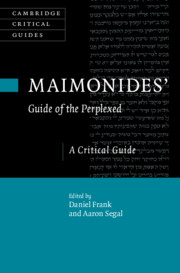Book contents
- Maimonides’ Guide of the Perplexed
- Cambridge Critical Guides
- Maimonides’ Guide of the Perplexed
- Copyright page
- Contents
- Contributors
- Introduction
- Part I Form
- Part II Human Beginnings
- Part III The Creator
- Part IV The Created
- Chapter 8 Creation and Miracles in the Guide
- Chapter 9 The Prophetic Method in the Guide
- Chapter 10 Maimonides’ Modalities
- Part V Human Finitude
- Part VI Human Ends
- Bibliography
- Index
- Cambridge Critical Guides
Chapter 8 - Creation and Miracles in the Guide
from Part IV - The Created
Published online by Cambridge University Press: 18 June 2021
- Maimonides’ Guide of the Perplexed
- Cambridge Critical Guides
- Maimonides’ Guide of the Perplexed
- Copyright page
- Contents
- Contributors
- Introduction
- Part I Form
- Part II Human Beginnings
- Part III The Creator
- Part IV The Created
- Chapter 8 Creation and Miracles in the Guide
- Chapter 9 The Prophetic Method in the Guide
- Chapter 10 Maimonides’ Modalities
- Part V Human Finitude
- Part VI Human Ends
- Bibliography
- Index
- Cambridge Critical Guides
Summary
Medieval Jewish philosophers thinking about creation were influenced by Aristotle’s model of an eternally existing world, by Kalam arguments for a created universe, and of course by the Biblical account of creation found in Genesis. Aristotle’s theory of time reinforces a cosmology supportive of an eternally existing universe, thus obviating the need for a creator. Although Aristotle’s eternity thesis is often regarded as the target of medieval philosophers, both Dhanani and Langermann suggest that it was possibly Galen rather than Aristotle who posed an equal if not greater threat. In contrast to Aristotle, both Greek and Islamic atomists denied the continuity of time, and posited the existence of discrete time atoms, thus undermining the very assumption that things “persist” through time. Like Aristotle, Galen was famous for having denied creation and emphasizing a self-contained natural order that eschewed a creator; because Galen was careful to reject atomism, the Islamic Kalam theologians might have gravitated toward atomism as an effort to develop an alternative world-view to the Galenic. Given Galen’s staunch anti-atomist views, Langermann suggests that “it is not beyond the realm of the possible that Galen’s notion of minima, and not just his reports concerning his atomist opponents, had some influence upon the Mutakallimûn.”
- Type
- Chapter
- Information
- Maimonides' Guide of the PerplexedA Critical Guide, pp. 143 - 160Publisher: Cambridge University PressPrint publication year: 2021
- 1
- Cited by

